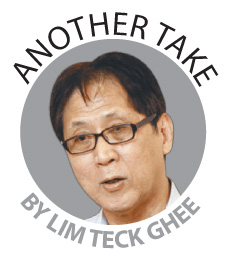IN the aftermath of George Floyd’s death, an unprecedented wave of protests against racism, police brutality, institutionalised discrimination and the failure of governments to deal with it, is sweeping many countries.
Millions of concerned citizens, especially the young, have taken to the streets to show solidarity with protesters in the United States. They are also strongly criticising their own government for policies that have directly or implicitly supported racist conduct, actions and policies.
Among the most powerful statements to emerge from the thousands of influential voices recorded in the mass media, one stands out in its bluntness. World heavyweight boxing champion Anthony Joshua told a crowd of Black Lives Matter protesters in Britain that they are the “vaccine” to the “virus” of racism.
In Malaysia there has been no public outcry similar to that which has taken place in over 50 countries.
Such protests have taken place despite the Covid-19 pandemic, during which gathering in crowds has been discouraged in some parts of the world, and is illegal in others.
The absence of a similar public protest here has not, however, deterred a few of our leaders from speaking up to call for the nation to examine its own track record with minorities.
Perhaps the most prominent has been Datuk Seri Nazir Razak, who in a posting on Instagram, said that he was late in doing so because he has been reflecting on how prevalent this problem is in Malaysian society.
“How minorities here face the same challenges every day. How institutionalised measures to redress inequality between races have been abused or become out of date, and need to be overhauled.
“How we don’t even define racism or legislate against it. Our nationhood – what it means to be Malaysian and how our government, economy and society work – needs recalibration.
“As there was in 1957 and 1970. We must do it before it is too late,” the retired banker said.
Another voice drawing inspiration from the protests is political commentator Prof Tajuddin Rasdi. Writing in the Chinese media he has attempted to provide the answer to the question as to why in his words “we cannot flatten the curve on the racism virus”.
According to him “firstly politicians like this situation very much as they can exploit it to gain votes under the pretext of saving their own race. So they can spout beautiful speeches about ‘We are all Malaysians and must live in harmony” but in actual backdoor speeches, say otherwise.
Secondly, he has noted that “some feel that Malaysia is a country belonging to them and them only. Others are immigrants. They don’t even acknowledge that their ancestors were also immigrants. They don’t even acknowledge the Sabahans and Sarawakians. Thus the term ‘pendatang’ and ‘orang tumpangan’ will always be popularly accepted.”
Thirdly, the adherents of one religious group are at times urged to protect their religion from others, who are also citizens. Some of them believe this country should belong to one religious group only.
In a pessimistic conclusion he argues that the curve of racism will never be flattened because racism is not considered a dangerous and indiscriminate enemy.
In his short but insightful message, Nazir Razak posed the need for “a new platform” to deliberate a new model for Malaysia.
Before we think of a new platform to discuss a new model to deal with the entrenched racism, it will be important to ask the difficult questions that are being asked around the world.
Malaysia’s virus may be quite different from what is found in the United States or other countries.
But it is still the number one subject of concern in the public and private arena. It also affects our lives every day in every way.
Taking this virus out into the sunlight of transparency can lead to a better understanding of this social sickness and how we can disinfect ourselves of its harmful effects.
This is the first of a series on “Racism in Malaysia”. Comments: letters@thesundaily.com













